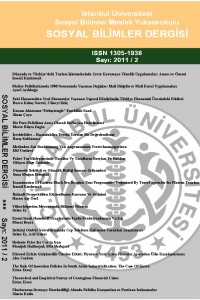Yıl 2011,
Sayı: 2, 135 - 141, 10.04.2012
Öz
ABSTRACT
The main aim of this study is introducing historical, political and cultural dimensions
of South Korean industrialization, without leaving aside the economic
perspective as one of the explanatory factor. In the investigation of industrialization,
the majority of the researches focused only on conducted economic policies as
an explanatory factor of the rapid growth in South Korea. However Asian societies'
communal tradition and institutions provided a suitable ground for strong developmental
government to stay in power during the industrialization process in the
South Korea. Consequently the ability to make especially long-term economic policy
projections in turn allowed policy decision makers to form entire economy in
accordance with the developmental goals in the South Korea.
Keywords: Strong Developmental Goevernment, Economic Perspective, Industrialization
Policies.
ÖZET
Bu çalışmanın temel amacı açıklayıcı faktörlerden biri olarak ekonomik bakışı
gözardı etmeden Güney Kore sanayileşmesinin tarihsel, politik ve kültürel boyutlarını
ortaya koymaktır. Güney Kore'deki sanayileşmenin incelenmesi esnasında
araştırmacıların çoğunluğu sadece uygulanan ekonomik politikalara odaklanmışlardır.
Oysa ki Asya toplumlarının komünal gelenekleri ve kurumları sanayileşme
süreçleri boyunca güçlü kalkınmacı hükümetlerin iktidarda kalması için uygun bir
ortam sağlamıştır. Dolayısıyla özellikle uzun dönemli politikaları belirleme
olanağına sahip olmaları, politika karar alıcılarının bütün bir ekonomiyi Güney
Kore'nin kalkınmacı amaçları doğrultusunda biçimlendirmelerine izin vermiştir.
Anahtar kelimeler: Güçlü Kalkınmacı Hükümet, Ekonomik Bakışaçısı, Sanayileşme
Politikaları.
Anahtar Kelimeler
Güçlü Kalkınmacı Hükümet Ekonomik Bakışaçısı Sanaıyileşme Politikaları
Kaynakça
- Amsden, A. H., "Asia's Next Giant, South Ko rea and Late Industrialization, New York, 1989, Oxford University Press.
- Bardhan, Pranab. "The Economics of Corrup tion in Less Developed Countries: A Rewiev of Is sues", 1996, Center for International and Development Economics Research (CIDER) Working Papers, C96- 064, University of California at Berkeley.
- Choi, H.S., "Transition from imitation to crea tion", Technological Forecasting and Social Change 33 (1989), 209-215.
- Hiwaki, Kensei., 1998, "Sustainable Developı ment: framework for a General Theory" Human Sysı tems Management, Vol. 17 Issue 4, p267.
- Jones, L . P. & Sakong, I., " Government, Business and Entrepreneurship in Economic Developı ment: The Korean Case", 1980, Harvard University Concil on East Asian Studies, Harvard East Asian Mongrphs, no.91, Cambridge.
- Keller, Wolfgang "Do Trde Patterns and Tech nology Flows Affect Productivity Growth?", The World Bank Economic Reviev, Vol. 14, No.1: 17-47
- Kim, L.,"National system of industrial innova tion: dynamics of capability building in Korea, in: Na tional Innovation Systems", Oxford University Press, Oxford, 1993.
- Kim, L . , "Technology policies and strategies for developing countries: lessons from the Korean experience", Technology Analysis & Strategic Man agement, Sep. 98, Vol. 10 Issue 3, Item Number: 1189509 p.311-324
- Koo, Hagen., "The Politcal Economy of Income Distribution in South Korea: The impact of the State's Industrialization Policies", 1984, World Development, 12, No.10, pp. 1029-1037.
- Nelson, Richard R., 1993, "National Innova tion Systems, A Comparative Analysis, Oxford Univerı sity Press.
- OECD, Rewievs of National Science and Tech nology Policy: Republic of Korea, OECD, Paris,1996.
- Simon, D.F. "Strategic Underpinnings of Elecı tronics Industry in the Newly Industrialized Economies of Asia", 1993, Wellenius, B., Miller, A. And Dahlman, C.J. Edition
- YILMAZ, Gaye., 1998, Sermaye Savaşları Şe kil mi Değiştiriyor? Asya Krizi , İktisat Dergisi, 1998, sayı:381, s.35)
Yıl 2011,
Sayı: 2, 135 - 141, 10.04.2012
Öz
Kaynakça
- Amsden, A. H., "Asia's Next Giant, South Ko rea and Late Industrialization, New York, 1989, Oxford University Press.
- Bardhan, Pranab. "The Economics of Corrup tion in Less Developed Countries: A Rewiev of Is sues", 1996, Center for International and Development Economics Research (CIDER) Working Papers, C96- 064, University of California at Berkeley.
- Choi, H.S., "Transition from imitation to crea tion", Technological Forecasting and Social Change 33 (1989), 209-215.
- Hiwaki, Kensei., 1998, "Sustainable Developı ment: framework for a General Theory" Human Sysı tems Management, Vol. 17 Issue 4, p267.
- Jones, L . P. & Sakong, I., " Government, Business and Entrepreneurship in Economic Developı ment: The Korean Case", 1980, Harvard University Concil on East Asian Studies, Harvard East Asian Mongrphs, no.91, Cambridge.
- Keller, Wolfgang "Do Trde Patterns and Tech nology Flows Affect Productivity Growth?", The World Bank Economic Reviev, Vol. 14, No.1: 17-47
- Kim, L.,"National system of industrial innova tion: dynamics of capability building in Korea, in: Na tional Innovation Systems", Oxford University Press, Oxford, 1993.
- Kim, L . , "Technology policies and strategies for developing countries: lessons from the Korean experience", Technology Analysis & Strategic Man agement, Sep. 98, Vol. 10 Issue 3, Item Number: 1189509 p.311-324
- Koo, Hagen., "The Politcal Economy of Income Distribution in South Korea: The impact of the State's Industrialization Policies", 1984, World Development, 12, No.10, pp. 1029-1037.
- Nelson, Richard R., 1993, "National Innova tion Systems, A Comparative Analysis, Oxford Univerı sity Press.
- OECD, Rewievs of National Science and Tech nology Policy: Republic of Korea, OECD, Paris,1996.
- Simon, D.F. "Strategic Underpinnings of Elecı tronics Industry in the Newly Industrialized Economies of Asia", 1993, Wellenius, B., Miller, A. And Dahlman, C.J. Edition
- YILMAZ, Gaye., 1998, Sermaye Savaşları Şe kil mi Değiştiriyor? Asya Krizi , İktisat Dergisi, 1998, sayı:381, s.35)
Toplam 13 adet kaynakça vardır.
Ayrıntılar
| Birincil Dil | Türkçe |
|---|---|
| Bölüm | Makaleler |
| Yazarlar | |
| Yayımlanma Tarihi | 10 Nisan 2012 |
| Yayımlandığı Sayı | Yıl 2011 Sayı: 2 |


